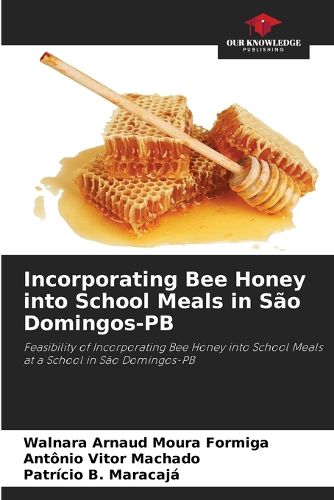Readings Newsletter
Become a Readings Member to make your shopping experience even easier.
Sign in or sign up for free!
You’re not far away from qualifying for FREE standard shipping within Australia
You’ve qualified for FREE standard shipping within Australia
The cart is loading…






This title is printed to order. This book may have been self-published. If so, we cannot guarantee the quality of the content. In the main most books will have gone through the editing process however some may not. We therefore suggest that you be aware of this before ordering this book. If in doubt check either the author or publisher’s details as we are unable to accept any returns unless they are faulty. Please contact us if you have any questions.
The aim of this study was to promote the introduction of bee honey into school meals at an urban elementary school in Sao Domingos-PB. The research was descriptive in nature, with a quantitative, qualitative and participatory approach. A sample was taken and questionnaires were administered before and after bee honey was added to school meals. The information was analyzed using Bardin's content analysis technique. It was concluded that the introduction of honey is feasible as long as there is nutritional education. Group 1 students had an acceptability index above the minimum set by the National Education Development Fund, while group 2 students had an acceptability index below the minimum required. The local farmers have shown an interest in producing honey, and the municipal managers have developed real actions that could lead to the permanent inclusion of honey on the school menu and local sustainable development, creating the Municipal Inspection System and establishing partnerships with SEBRAE (Brazilian support service for micro and small enterprises) to encourage the local beekeeping agribusiness.
$9.00 standard shipping within Australia
FREE standard shipping within Australia for orders over $100.00
Express & International shipping calculated at checkout
This title is printed to order. This book may have been self-published. If so, we cannot guarantee the quality of the content. In the main most books will have gone through the editing process however some may not. We therefore suggest that you be aware of this before ordering this book. If in doubt check either the author or publisher’s details as we are unable to accept any returns unless they are faulty. Please contact us if you have any questions.
The aim of this study was to promote the introduction of bee honey into school meals at an urban elementary school in Sao Domingos-PB. The research was descriptive in nature, with a quantitative, qualitative and participatory approach. A sample was taken and questionnaires were administered before and after bee honey was added to school meals. The information was analyzed using Bardin's content analysis technique. It was concluded that the introduction of honey is feasible as long as there is nutritional education. Group 1 students had an acceptability index above the minimum set by the National Education Development Fund, while group 2 students had an acceptability index below the minimum required. The local farmers have shown an interest in producing honey, and the municipal managers have developed real actions that could lead to the permanent inclusion of honey on the school menu and local sustainable development, creating the Municipal Inspection System and establishing partnerships with SEBRAE (Brazilian support service for micro and small enterprises) to encourage the local beekeeping agribusiness.